- Home
- Augusten Burroughs
Lust & Wonder
Lust & Wonder Read online
Begin Reading
Table of Contents
About the Author
Copyright Page
Thank you for buying this
St. Martin’s Press ebook.
To receive special offers, bonus content,
and info on new releases and other great reads,
sign up for our newsletters.
Or visit us online at
us.macmillan.com/newslettersignup
For email updates on the author, click here.
The author and publisher have provided this e-book to you for your personal use only. You may not make this e-book publicly available in any way. Copyright infringement is against the law. If you believe the copy of this e-book you are reading infringes on the author’s copyright, please notify the publisher at: us.macmillanusa.com/piracy.
For Crsripley
I
Just when I broke my sobriety and started drinking again in moderate and controlled measure exactly like a normal person, I met this guy who wasn’t just a guy but a writer, and not just a writer but the author of one of my favorite books.
In AA, you are brainwashed into believing that all the good stuff happens only after you stop drinking. Clearly they are lying; my life improved significantly as soon as I ordered a cocktail.
Our meeting was very romantic, at least by the gay standards of the mid-1990s. Which is to say not at a gym or in the midst of a spiraling blackout but through fan mail. I sent him a note:
Dear Mitch,
Let me just say right off that I am not Kathy Bates in Misery. I do not have a double-headed axe or a criminal record. In fact, I was at my friend’s apartment and saw a copy of your most recent book on his shelf. I pointed to it and said, “Isn’t that the sickest, most wonderful novel, ever?” He explained that he hadn’t actually read it but that you and he had gone out on a date six months ago and, for whatever reason, it just didn’t work out. Which is how I got your e-mail address. I probably sound crazy, like a stalker. Like a “fan.” But I’m really very normal, stable, healthy, and maybe even a little bit boring. If you’re interested, write me back. I’m attaching a photo I took of myself just five minutes ago. And yeah, I do own shirts.
He replied almost instantly, like he’d been expecting to hear from me. “I’d love to meet you,” he wrote. “You look great!”
The swiftness and brevity of his reply caused me to instantly resent him. I felt deprived of suspense and the luxurious anxiety of wondering if I’d made a fool of myself by attaching a shirtless photo with my stalker note.
Now he was the dish of wrapped peppermints next to the cash register that I didn’t want because they were free.
Because his reply to my note expressed only his desire to meet me along with a compliment, I almost felt like I could have achieved the same result by sending no words at all; just the shirtless photo of me standing on my shabby terrace. It was even possible he had looked at my picture and then merely skimmed my carefully crafted e-mail.
And while it was true that I was working out for two hours every day so that I could have the kind of body that inspires in others a sickening feeling of jealousy and inferiority, it was also true that I, myself, looked down on people with such bodies and felt myself vastly superior to them. I would simply never date somebody with a body like mine; they would be too vapid.
I made-believe I didn’t feel this way by once again studying the author photo on the back cover of his book. But he’s so handsome. And he’s published! These two qualities, when combined, seemed to detonate any developing sense of doubt.
Besides, just the fact that he had an author photo was enough.
I understood that I was clearly insane. But he apparently hadn’t picked up on how many times in one short letter I asserted that I was not. This acceptance of my questionable mental health made me feel confident that we would be compatible, possibly for life.
I wrote him back right away and suggested we meet that very evening.
The restaurant where we met was located between our two apartments in the East Village and featured a great deal of pale-blue neon in the window, which stained us as we sat in our booth.
We each ordered a vodka martini, and he automatically offered me his olive, which I read as a very good sign. Olives are the wishbones of the cocktail world; rarely are they freely passed along to somebody else.
He blushed and averted his eyes when I praised his novel, seeming genuinely uncomfortable. This caused me to fawn even more, which in turn made him down the rest of his martini and signal the waiter for another.
It was a strangely powerful feeling to watch my words of praise disassemble his composure like that. Which is probably why I continued and elaborated in multiple directions by saying, “I love that you have a cleft chin,” and “I think you look even better in person than in your author photo.”
He asked about me, and I gave him a slightly sanitized version. “Well, I’ve been an advertising copywriter since I was nineteen. I’m freelance now, which is better because it’s forced me to care less, and for some reason, this has improved the quality of my work.”
I left out the fact that I’d been shoved into rehab a year and a half before because I was such a disaster, always missing meetings or showing up to them drunk, which was even worse.
When Mitch asked me about my family, I took a sip from my drink and said, “I’ve never been very close to them.”
I had long ago learned not to unload all of my sordid past on somebody during the first date. I had done this very thing in the past, and it hadn’t worked out well. When people find out your mother was mentally ill, your father was a chronic alcoholic, and you spent most of your childhood being raised by your parents’ eccentric and possibly insane psychiatrist in his run-down mental hospital of a house, they tend to back away. In order to make them lean in and want more, I had to polish certain elements from my life, while omitting others entirely.
“My mother was a poet,” I told him, leaving out the fact that she was a poet on antipsychotic medications and had been hospitalized throughout my childhood.
Mitch didn’t press me for additional details about my family. The only thing he wanted to know was, “How did you get into advertising at nineteen?”
I told him, “I was living in San Francisco,” as though that would explain everything. Which, actually, it did.
* * *
Just before turning eighteen, I moved to Boston with the money I’d saved from being a Ground Round waiter, enrolling in a computer programming trade school called Control Data Institute. Just before I graduated nine months later, I saw the most hideous, downscale daytime TV commercial for my own school. It made me realize that I was most certainly not at MIT.
I was so mortified.
I thought, Somebody thought of that. It came into their head, and they said, “Yeah.”
I realized I could think of a better ad than that one without even trying. Then to prove it to myself, I sat down with the only magazine in the apartment—a copy of Fortune that belonged to my roommate—and going page by page, I rewrote every ad in it.
The only paper I had to type on was the blank side of my programming flowchart paper from school, so I used that. As a result, my first “portfolio” was pink.
Then, because I didn’t know (or care) any better, I started to call advertising agencies in Boston, asking if I could come in and show them my ads.
Every ad agency I contacted agreed to meet with me. That blew me away.
But the result was the same each time: humiliation. One creative director sneered, “Um, ads have visuals? Not just words. Your spelling is just horrendous. And why do you have commas all over the place?”
It didn’t help that my portfolio case was a paper bag.
I was broke.
I was also totally over computer programming school. I cheated my way through the rest of it—not because it was difficult but because I needed to spend my coding time writing pretend ads for my ever-expanding portfolio.
Because now that I had decided on advertising, I was determined.
Each day, I would walk the four miles from where I was staying into Boston’s business district. I didn’t care about my feet. I didn’t need a drink of water; the sweat would eventually evaporate, and I would eat something when I got home.
All that mattered was advertising. I had to get in.
Advertising came naturally to me. I could write fifty ads for the same can of tuna. What I didn’t know was if even one of those ads was any good.
I was starting to worry the answer might be no. I’d arranged interviews with a dozen agencies, which I now knew were called “shops,” and I couldn’t shake the feeling that to most people, I was kind of an eccentric joke. Definitely not a copywriter.
The problem was, there were only a couple of agencies I’d failed to meet with. I was running out of options.
Then a creative director at one of these last-on-the-list ad agencies told me this: “Half of the words in this portfolio are incorrectly spelled. You overuse commas. These ads themselves look terrible, like each one has been touched by dozens of dirty hands. And there are about thirty ads too many here. It’s good that you have range, but you can still demonstrate that with twelve to fifteen ads, total. And here’s my last comment, and it’s the big one.”
I had long, curly hair and wore sunglasses twenty-four hours a day. I had a hoop earring like a pirate. I wore extremely baggy, deconstructed clothing at a time when the rest of the world was into zippers and Spandex. And I had now met with practically every agency in Boston and even a bunch of the stores, looking for something in-house.
This guy had been my last chance.
And here he was, just layering on “no” in a hundred different ways. I wanted to evaporate, not just leave his office. I didn’t want any more of his words on me.
He leaned forward and looked at me with a strange intensity. It made me stop fidgeting, and it made me keep looking at him. But most of all, that gaze of his made me listen.
He said, “I understand that you may have limited finances, but let me tell you something. If you are going to walk into my office with a paper bag filled with ads—not even an inexpensive black portfolio case like you could pick up in Harvard Square for twelve bucks but a plain old brown paper bag—if you have the nerve to do that? Then the ads inside that paper bag had just better be the best ads I have ever seen in my life.”
Well, he was right.
There was nothing I could say to him, because he was just right.
It didn’t matter that I could never afford to spend twelve dollars on something that was not then digested. He was right. I was wrong.
But he continued, “And that is exactly the situation here. This is the best portfolio I have ever seen from a junior writer. And if one person tells you otherwise, that person is lying, because you have an obvious and enormous talent. You will get your job in advertising, but it won’t be in Boston. This town is too conservative. You belong where they are doing the best work in the country—you belong in San Francisco.”
With those words, that man changed my life. Because I didn’t need to have enormous talent. Just enough to get me a job in advertising. The man had not given me hope; he had given me a surplus of it.
As it happened, a fellow graduate of the Control Data Institute was heading west. And when you are traveling from Boston to San Francisco by car, it’s kind of great when your friend happens to be a car guy.
We did not pass one other Mercury Merkur XR4Ti the entire way. It was bulbous, nearly oblong, white, and fast with a spoiler in back that was more like a wing. It resembled no car ever seen on an American highway. In about four years, all new cars would feature these smooth, egg-inspired curves, but in 1985, it was as if we were driving across America in something from the distant future.
When we pulled into a gas station in Omaha, Nebraska, or Kalispell, Montana, every last person would stare.
From out of this curious, even worrisome pod of a car would step one normal guy and me: nineteen, usually barefoot, dressed like a half girl, wearing sunglasses, and out of my mind with excitement about my future.
I would look at the gawking farmers, dungaree-wearing good old boys, sandpapery ranch workers, and engine-stained mechanics, and I would smile at them and think to myself, I could sell you panty hose.
I loved the way that car punched you in the kidneys every time the turbo kicked in.
After all the detours, pit stops, and side trips, it would be a few weeks before we arrived in San Francisco. If my friend hadn’t been so generous with his credit card, I would have been forced to walk most of that way.
But we did make it to San Francisco. And even when I am eighty-three years old and strapped to my foam mattress in the basement of a nursing home, I will never forget the surprise of San Francisco—the lusty, big-breasted, glittering, and thigh-slapping shock of it. I knew only one thing about San Francisco: it was where the gays lived.
Now I knew why.
If you are a kid who came from a garbage dump of a life and your feet have inch-thick calluses because even shoes feel oppressive and your hair is as long as you can grow it because it is fucking yours and you wear sunglasses all the time so that nobody can see your eyes and be able to tell that, despite all appearances to the contrary, you were carved from a solid block of goodness and kindness and grace but are now so ruined and so young that there is not one logical reason for anybody to believe you will ever be anything—somehow, you just know. You know. If you are this person, I happen to know from personal experience that San Francisco will not merely welcome you. San Francisco will give you the longest, hottest bath you have ever had. It will drape a fresh, white cotton shirt over your shoulders, and even though this shirt will be three sizes too big, it will fit you better than any shirt ever has or ever will. And once you are sitting in an overstuffed armchair that has been warmed for you by a cat, San Francisco will muss your hair. You will have some milk and one of those thick brownies with a shiny top that shatters when you bite it. And then, as you walk down the long hallway toward your bedroom, San Francisco’s fishnet stocking–clad leg will suddenly rise up and block your way. San Francisco will smile and say, “Hon? Either brush those teeth or donate them to the pointy end of my boot.” And you will brush your teeth and never have another cavity. Until you’re forty. Then San Francisco will tuck you into bed like you are a baby, and this will not embarrass you at all. And even though you’re nineteen, San Francisco will leave the light on; you won’t even have to ask. And when you wake up, San Francisco will be the first thing you see when you open your eyes. And it will say to you, “You know it. And I know it. Get out there and make them see it.”
The very first advertising agency to meet with me hired me. The creative director was unlike any I had ever seen back in Boston. This one dressed even more outrageously than I did, had way longer hair, and much, much longer nails, which were bright red.
I was in awe of her.
She loved advertising as much as I did, but she knew so much more. I was like her disciple, not her employee. I would sit in her office in the morning while she ate the top off her muffin, passing me the base.
“Never use the word delicious, because it doesn’t mean anything anymore,” she told me.
I did a lot of work at that agency, and some of it finally got attention from New York. Headhunters started to call and ask if I would be interested in flying out to meet with a few agencies.
I’d always wanted to live in Manhattan, but not as a poor, starving artist. Coming from San Francisco with some work under my belt, I’d be able to earn a respectable income. I loved San Francisco, but I knew I belonged in New York.
My first job was at a legendary agency named Ogilv
y & Mather. But it was a real culture shock after the boutique-sized San Francisco agency. There was a lot of politics and backstabbing, not to mention a massive antique pub bar in the cafeteria.
Another difference was that people changed jobs with a lot more frequency in New York. That’s how you got a raise. So after a couple of years, I hopped over to another agency and then another and then several more. My portfolio improved over the years, but I never had that sense of family I’d experienced in San Francisco. I never had another genius boss like Lynda.
I was very good at advertising, but being good at something wasn’t necessarily a good reason to continue doing it. I no longer loved it; I didn’t even like it. It was just the same day, over and over with different clients, different products. It wasn’t fun anymore.
But I couldn’t do anything else, and that was the problem.
At least I could do it freelance. If you loathe your job, the situation is improved if you can do it in your underwear. Drunk.
* * *
Several months after our first date, I was madly (mostly) in love with Mitch; it was just every single cliché and Whitney Houston song strung together into one endless, intolerable group hug.
Our relationship had reached the key stage.
Mitch was the one who brought it up, which was unexpected and refreshing, like walking into the kitchen after preparing a hurricane of a meal for a dozen people and finding it utterly, miraculously spotless.
We were standing and facing each other.
“Do you think it’s too soon to exchange keys?” he asked. He had his hands in his pockets, and he rolled forward a little off his heels. This had the pleasing effect of making him seem magnetically attracted to me.
I hadn’t even thought about exchanging keys, but when I did, I realized there was no such thing as “too soon.” That was exactly the right moment to do it, and he was exactly the right guy to bring it up, gallantly sparing me.
“Not at all,” I said.

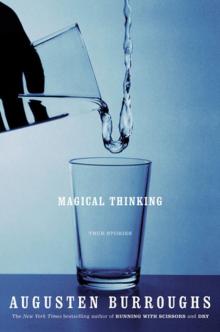 Magical Thinking: True Stories
Magical Thinking: True Stories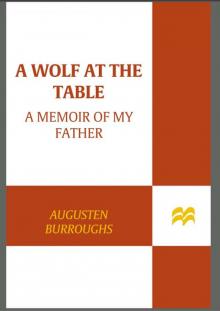 A Wolf at the Table
A Wolf at the Table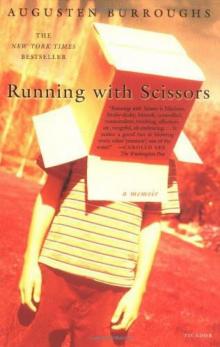 Running With Scissors
Running With Scissors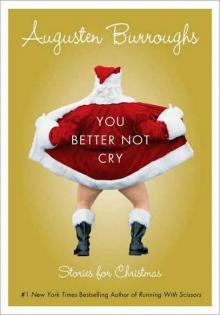 You Better Not Cry: Stories for Christmas
You Better Not Cry: Stories for Christmas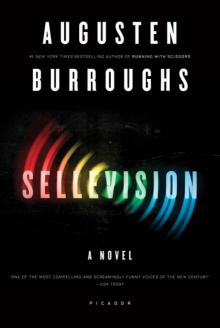 Sellevision
Sellevision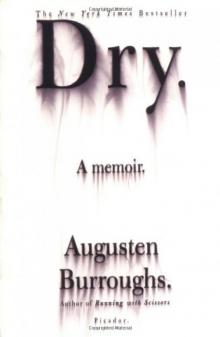 Dry
Dry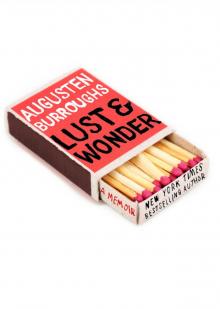 Lust & Wonder
Lust & Wonder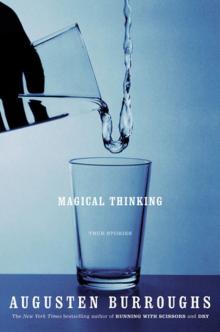 Magical Thinking
Magical Thinking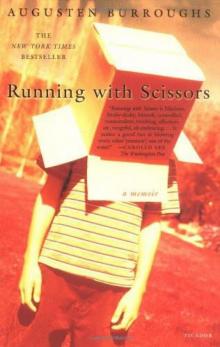 Running With Scissors: A Memoir
Running With Scissors: A Memoir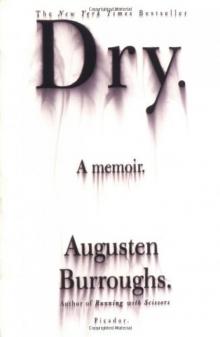 Dry: A Memoir
Dry: A Memoir